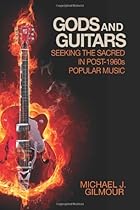Read Gods and Guitars: Seeking the Sacred in Post-1960s Popular Music by Michael J. Gilmour Online
* Gods and Guitars: Seeking the Sacred in Post-1960s Popular Music ✓ PDF Read by ! Michael J. Gilmour eBook or Kindle ePUB Online free. Gods and Guitars: Seeking the Sacred in Post-1960s Popular Music Midwest Book Review said Explores the lyrics of popular and influential songs. From the African-American songs of the 19th century through the folk music and rock of the "Explores the lyrics of popular and influential songs" according to Midwest Book Review. From the African-American songs of the 19th century through the folk music and rock of the 20th century, a significant segment of popular secular music has been endowed with profound spiritual messages focused on themes social justice and th

| Title | : | Gods and Guitars: Seeking the Sacred in Post-1960s Popular Music |
| Author | : | |
| Rating | : | 4.60 (729 Votes) |
| Asin | : | 1602581398 |
| Format Type | : | paperback |
| Number of Pages | : | 180 Pages |
| Publish Date | : | 2017-10-29 |
| Language | : | English |
Though American attitudes toward religion changed dramatically during the 1960s, interest in spirituality itself never diminished. Probing the lyrical canons of seminal artists including Cat Stevens, the Rolling Stones, Bob Dylan, Eric Clapton, Joni Mitchell, Neil Young, U2, Ozzy Osbourne, Pearl Jam, Madonna, and Kanye West, Gilmour considers the ways--and reasons why--pop music's secular poets and prophets adopted religious phrases, motifs, and sacred texts. . If we listen closely, Michael Gilmour contends, we can hear an extensive religious vocabulary in the popular music of the decades that followedarticulating each generations spiritual quest, a yearning for social justice, and the emotional highs of love and sex
Midwest Book Review said Explores the lyrics of popular and influential songs. From the African-American songs of the 19th century through the folk music and rock of the "Explores the lyrics of popular and influential songs" according to Midwest Book Review. From the African-American songs of the 19th century through the folk music and rock of the 20th century, a significant segment of popular secular music has been endowed with profound spiritual messages focused on themes social justice and the emotional ramifications of love, sacrifice, and even the occasional biblical text. In "Gods And Guitars: Seeking The Sacred In Post. 0th century, a significant segment of popular secular music has been endowed with profound spiritual messages focused on themes social justice and the emotional ramifications of love, sacrifice, and even the occasional biblical text. In "Gods And Guitars: Seeking The Sacred In Post
This may not appear at first to be an enlightened perspective, but the author's artful use of Rushdie's fiction clearly shows how it is possible. All rights reserved. From Publishers Weekly What do Salman Rushdie and literary criticism have to do with rock music? For Gilmour (Call Me the Seeker: Listening to Religion in Popular Music), these things are very much related. His treatment enriches the dialogue between religion and rock well beyond the usual Judeo-Christian interpretations. The author believes that song lyrics can sometimes stand on their own apart from music, and moreover, they can reveal something about an artist's religious and spiritual views. The usual suspects in the religion and rock conversation (U2, Springsteen) are not as prominent, leaving room for more obscure but equally vital musicians like Daniel Lanois and Burton Cummings. (Nov.) Copyright © Reed Business Information, a divisio
Download Gods and Guitars: Seeking the Sacred in Post-1960s Popular Music
Download as PDF : Click Here
Download as DOC : Click Here
Download as RTF : Click Here
